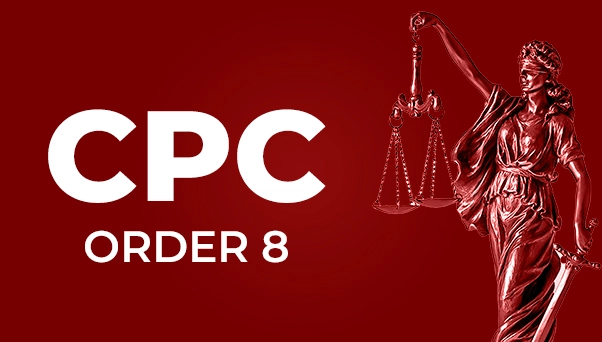Understand the Key Role: CPC Order 8 in Civil Cases
In civil cases, the Civil Procedure Code (CPC) of 1908 lays out the legal process which covers the defendant's response to the plaintiff's complaint. This includes filing a written statement, set off claims, and counter claims. Let's explore Order 8's nuances, importance, and impact on civil litigation.
What is Order 8?
This legal rule governs how defendants can present their side of the story. It is the defendant's written response to the claims made by the plaintiff. In this document, the defendant outlines their defenses, objections, or counterclaims against the allegations in the plaint. Order 8 sets clear guidelines for the format, content, and timeline for submitting this written statement. The defendant's narrative is structured following specific legal rules.
Key Provisions of Order 8
Rule 1 - The Written Statement is a necessity. The defendant has thirty days from the date they receive the summons to submit a written defense. However, the court may extend this period up to ninety days if deemed appropriate.
Rule 2 - Specific Denial is crucial. The defendant must explicitly deny each factual claim made in the plaint. Failure to clearly refute any allegation implies the defendant accepts that particular fact as true.
Rule 3 - Responding with Precision
The third rule mandates that the defendant must address each factual claim they are required to deny with specificity. If the defendant intends to refute a fact, they must do so directly, without evasion, and tackle the core issue. Any allegation not explicitly denied, implied as such, or stated as unacknowledged in the defendant's pleading is deemed admitted. This rule promotes clarity in identifying the defendant's disputed points, averting ambiguity that could otherwise prolong legal proceedings.
Rule 4 - Evasive Denial
Rule 4 specifies that denials must be direct and unambiguous, not vague or evasive. A defendant cannot indirectly deny allegations, hoping to create confusion. If the claim states they received a certain amount on a specific date, they must explicitly deny receiving that sum on that day. They cannot simply state they did not receive it or received a different amount. This rule ensures defendants clearly address the plaintiff's claims, facilitating a more efficient legal process.
Rule 5 - Don't deny claims? Consider them admitted! If accusations aren't refuted specifically, they stay unrefuted by implication.
Rule 6 - Defend yourself thoroughly! Address each point raised against you, explaining why your grounds oppose the claims.
Rule 6A, 6B, 6C - Counterattack! Don't just defend you can counterclaim before finalizing your defense, if related to the original suit.
Rule 7 covers cases where a defendant's defense or set off bases differ. The defendant must then list and number each defense or set off distinctly. This organization ensures clarity, aiding both parties in identifying and addressing individual defenses efficiently, whether in pleadings or trial. It promotes orderly defense presentation and comprehension for the court.
Essentially, Rule 7 requires separate, numbered defenses when grounds diverge. This clear delineation facilitates understanding and response to each component of the defendant's argument. The rule streamlines proceedings by demanding structured articulation of the multifaceted case.
The new facts relied on by the defense must get detailed in the written statement.
According to Rule 8, the defendant has to specifically mention any fresh information that forms their defense, right of set off, or counterclaim. This rule aims to ensure the court is made aware of all pertinent facts and claims from the outset. By doing so, it allows the plaintiff to respond appropriately if required. Introducing entirely new arguments later could potentially disadvantage the plaintiff's position or delay the litigation process unnecessarily. Therefore, Rule 8 mandates disclosing all relevant facts upfront, promoting transparency and efficiency in legal proceedings.
Rule 9 governs the presentation of subsequent pleadings after the defendant's written statement. No further pleadings are allowed, except for defenses against any set off or counter claim, unless permitted by the court.
Rule 10 deems the defendant's inaction as an admission of the plaintiff's claim. However, the defendant can still contest the claim later by obtaining permission from the court and providing a satisfactory explanation for the delay. The court may grant this permission on reasonable terms, such as paying the plaintiff's legal costs incurred due to the defendant's failure to file a timely response. If the defendant continues to neglect submitting a written statement after obtaining permission, the court can strike out the defense and proceed with the case as if no defense had been presented. This rule incentivizes defendants to actively participate.
To Conclude
The rules of Order 8 in the Civil Procedure Code are vital for civil cases in India. They make sure the defendant gets a fair chance to present their side. This upholds justice and fairness. Understanding Order 8 is important for lawyers and parties involved. It guides how to prepare and file written statements. These are crucial for the defense in a civil suit. Following Order 8 ensures claims or defenses are properly represented. This allows for a just resolution of disputes.
